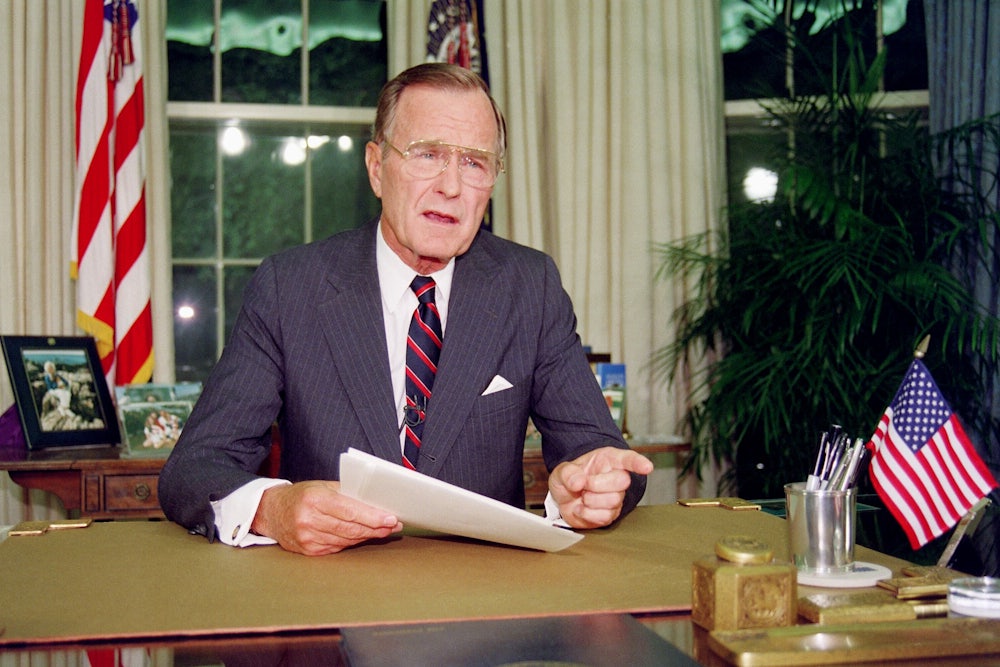On Friday night, the family of former president George Herbert Walker Bush announced his death at age 94.
Statement by the 43rd President of the United States, George W. Bush, on the passing of his father this evening at the age 94. pic.twitter.com/oTiDq1cE7h
— Jim McGrath (@jgm41) December 1, 2018
He was a Republican through and through, but towards the end of his life lived to see his party evolve away from his politics. Bush embodied, almost to the point of caricature, the older tradition of upper-class New England Republicanism. He came to this tradition by pedigree. He was born in Connecticut in 1924, the son of a Wall Street banker turned senator.
Almost everything in Bush’s impressive resume bespoke an allegiance to the country club establishment that once governed the Republican Party: Andover Prep School, distinguished naval service, Yale, membership of the elite Skull and Bones secret society, ambassadorship to the United Nations, a term as envoy to China, a brief stint as head of the CIA. This is the career trajectory of an internationalist Republican, one committed to maintaining America’s role as the cornerstone of the global order.
Bush tried to navigate, often uneasily, between the moderate Republican tradition he was reared in and the rising conservative wing of the party. He was, in truth, no liberal. His supposed moderation was mainly a question of style. But that style counted for something. Unlike Ronald Reagan, Bush didn’t speak the lingo of movement conservatism, even when he advocated for conservative politics.
As The Washington Post notes, “During the 1980 primaries, Mr. Bush positioned himself as a moderate, pragmatic alternative to Reagan, and he derided as ‘voodoo economics’ the former California governor’s vow to simultaneously cut taxes, boost defense spending and balance the budget.”
This stance made Bush widely distrusted by conservatives even when Reagan picked him to be the Republican Vice-Presidential candidate in 1980. To overcome his reputation for being squishy (the infamous “wimp factor”), Bush went overboard in the 1988 election, running rancid racist ads featuring Willie Horton and making demagogic appeals to issues like flag burning. This won him the election, but it was a hollow victory. Conservatives deserted him after he broke his promise of “no new taxes,” while liberals never learned to trust him. After the severe 1991 recession, he became deeply unpopular, an emblem of an out-of-touch chief executive. His failure to win re-election was inevitable.
His lasting legacy as a president will be in foreign policy. His calmness in responding to the collapse of communism, first in Eastern Europe and finally in the Soviet Union, ensured an orderly end to the Cold War. In answering Iraq’s invasion of Kuwait with an international coalition, Bush created, for better or worse, the model for continued American interventionism in the post-Cold War era. Bush’s decision not to overthrow Saddam Hussein also set the conditions for future conflict. In a very real sense, we’re still living in the aftermath of Bush’s actions, which created a tangled inheritance for his son George W. Bush and subsequent presidents.
The pardons Bush granted in the Iran-Contra case (notably to Casper Weinberger and Robert McFarlane) were disgraceful. They helped cement a tradition of elite impunity which undermines the rule of law. Donald Trump’s habit of granting deeply partisan pardons (Joe Arpaio, Scooter Libby, Dinesh D’Souza) fall in that tradition. If there is a constitutional crisis in the Trump era, the roots can be traced back to Bush’s presidency.
Bush’s politics were a constant effort to find a balance between the demands of right-wing Republicans and the larger world. He died at a moment when his style of politics was completely out of fashion in his own party. President Donald Trump—boorish, anti-intellectual, ignorant of policy, contemptuous of alliances, stridently partisan—is in many ways the antithesis of George H.W. Bush.
Because of the moment of his death, Bush’s passing seems like more than the demise of one man. It truly is the end of a political tradition.
